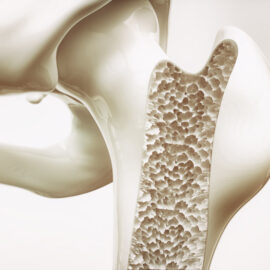There is a saying attributed to David Bowie that “aging is an extraordinary process where you become the person you always should have been.” It’s true that the wisdom and perspective that come with age are some of the clearest benefits of the passage of years; after all, the “old age” of today, where people regularly live into their 80s and 90s, is an experience that most of the human population hasn’t experienced.
There is a trade-off, however. Despite all the knowledge and experience gleaned from decades of traveling, working, and getting to know people, the body deteriorates even as the mind grows sharper. This manifests most conspicuously as the skin becomes wrinkly — a result of the skin losing its elasticity with age and becoming drier as it produces less oil — and the skeleton becoming more brittle as the bones lose essential minerals like calcium.
Aging and Your Bones
Our bones are fascinating constructs of fluid, tissue, and minerals, many of which grow after we are born and are in a constant state of renewal as bone tissue is broken down and replaced by the body. As we grow older, our bones require a more conscientious effort on our part to keep them healthy. In fact, there are numerous factors that go into the bones becoming unhealthy over time, all of which we should be aware of and counteract if possible. They include:
- Alcohol and Tobacco Use: Frequent smoking and the consumption of more than one alcoholic beverage a day can be a leading cause of osteoporosis.
- Hormone Imbalance: Hormones have an extremely important effect on our bone density, as having too much or too little of a hormone may lead to problems. Women, for instance, suffer from dramatic bone loss due to menopause; they are also at risk of osteoporosis if they haven’t menstruated in a while. Meanwhile, men are at similar risk if their testosterone levels dip.
- Certain Medications: As any of Utah’s orthopedic surgeons will tell you, certain pharmaceuticals can have an adverse effect on your bones, such as those meant to treat cancer. It is unfortunate that some of the medicine most often taken by seniors can lead to bone damage, as a side effect.
- Cell Degeneration: As we age, our cells naturally begin to break down and the functionality that we’ve relied on our whole lives ceases. Our joints become stiffer as the fluid inside the synovial membrane (the connective tissue that lines the joints) decreases and the cartilage thins. Meanwhile, the cells that renew the tissue of the joints aren’t renewed as they die.
Clearly, there are a lot of factors that go into the pain we feel in our bones as we age; some we have control over and many we do not. Dr. Skedros, an elbow and shoulder surgeon and a medical professor of osteology, takes bone health seriously. As a researcher of osteoporosis, he counsels his patients in all the ways that they can counteract the effects of aging on the joints. Certainly, as we age the telltale signs of popping, creaking, and strain will signify that it’s time to get serious about the things we can control.
Turning Back the Clock
While we aren’t able to control the behavior of our cells, there are things that we can do to keep Utah’s orthopedic surgeons at bay. This includes:
- Increasing Our Calcium Intake: Calcium strengthens our bones and helps counteract the process of them becoming brittle. Healthcare professionals advise that adults aged 19-70 get at least 1,000 mg of calcium a day; this number increases to 1,200 for women once they’ve reached age 50.
- Increase Our Vitamin D Intake: The body’s ability to absorb calcium is directly linked to its stores of vitamin D. Adults aged 19-71 are recommended a daily allowance of 600 international units (IUs) a day, which then increases to 800 IUs after their 71st birthday.
- Frequent Physical Activity: There are very few things, regarding our bodily health, that aren’t positively affected by daily exercise. Walking, climbing stairs, and lifting weights safely all contribute to strong bones and slow bone loss, while resistance training like pushups and band curls release calcium and magnesium into the bones.
- Choose a Better Diet: A young person’s reliance on saturated fats, processed sugars, and sodium in their diet will speed up bone loss, making it difficult for people to walk and bend their joints. Focusing instead on healthier alternatives and food diversity will do much to prevent shakiness and falls.

